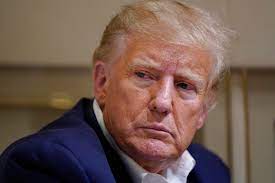Jennifer Rodgers
As Fulton County District Attorney Fani Willis ended her press conference late Monday night, she said former President Donald Trump and his 18 co-defendants would have until Friday, Aug. 25 to voluntarily surrender for their alleged role in trying to overturn the 2020 presidential elections in the state. All defendants who have commented thus far – including Trump – have denied wrongdoing.
While Trump is likely to comply with Willis’ demand – he has voluntarily surrendered in the other three criminal cases he faces – that is likely the easiest hurdle Willis will face in her quest for justice for the people of Georgia. To begin, Willis – and the assigned judge – will struggle to schedule a speedy trial. Though Willis has asked the judge to set a trial date for March 4, 2024, it must be slotted into a very crowded trial calendar for the former president, who is in the middle of a busy presidential campaign – which will only get busier into 2024. And, assuming that Willis wants to leave the case intact and try all defendants together, as she said she intends to do, Trump’s lack of availability will govern the entire case.
In addition, each defendant in the case increases the time it takes to get to trial – and to conduct a trial – because each defendant will have their own motions to make and issues to raise about an endless variety of matters. And the more defense lawyers that are involved in the case, the more challenging it is to find dates that work with the schedules of all defendants and their counsel. The truth is, 19 defendants is a non-starter – logistically, a trial with that many people would be near-impossible – but even if most of the defendants plead guilty, as many of them may do to avoid the substantial risk of prison time, a multi-defendant RICO trial is likely to take months.
Team Trump will certainly lean into the notion that these proceedings should be delayed until after the election. As he has in the other cases, Trump will likely try to string out pretrial litigation as much as possible, and will argue that the campaign – and the existence of the other cases – provide reasons to set a trial date after the 2024 election. This argument has been partially successful with US District Judge Aileen Cannon in the federal classified documents case. She recently set a May 2024 trial date – earlier than Trump wanted, but half a year later than the prosecution was seeking. Given the additional charges and the indictment of a third defendant, it is possible that Cannon will move the case further back.
It is unclear whether the judge assigned to the Georgia case would be amenable to delay arguments. Fulton County Superior CourtJudge Scott McAfee has been a judge only since February of this year, so his track record on such requests is unknown. I expect that, as in the New York case, where the judge recently denied such a motion, Trump will seek to move the case against him to federal court. Mark Meadows, his former chief of staff and co-defendant in the Georgia indictment, has already filed such a motion. This may seem to be a more favorable venue for the defense because of the greater odds of a potentially more conservative jury pool and the possibility a Trump-appointed judge would preside over the case.
Trump may believe that the chances of success in moving the Georgia case to federal court are higher than they were in New York, because on the surface, there is a stronger argument that the alleged crimes of election interference are more related to his presidential duties than was true in the New York hush money case, where the conduct occurred before he even took office.
But it’s still an uphill battle, because removal to federal court is unusual in criminal cases and only applies in limited circumstances. The statute most likely to be invoked by the former president – 28 US Code Section 1442(a)(1) – allows removal where a federal officer is charged with an act related to their official duties. This statute requires Trump to establish that he was an “officer” acting within the scope of his professional responsibilities when he conducted his pressure campaign on Georgia officials.
However, asking the Georgia secretary of state to “find” votes to change election results seems to be the opposite of trying to ensure integrity in the 2020 Georgia race. More to the point, ensuring electoral integrity is not the president’s job, but that of those very officials Trump was trying to undermine. Trump and others in the case may also move for a change of venue. The defense could seek a more advantageous jury pool in a part of Georgia where the 2020 vote favored Trump over Biden. Fulton County, Georgia’s most populous county, went convincingly for Biden in 2020, but Trump won most counties in the state.
The defense is likely to argue that the significant amount of publicity about the investigation has tainted the jury pool in liberal-leaning Fulton County, perhaps citing the media tour of the grand jury foreperson as evidence of that. The foreperson’s statements do not appear to have violated the grand jury rules, though her tour plays into what I expect will be the defendants’ larger claim that the vast public interest in this case means they cannot get a fair trial in Fulton County.
A change of venue motion is a long shot, however. Publicity about these events and the case is hardly limited to the Atlanta area, such that moving the trial will make virtually no difference in the jury pool’s exposure to news coverage of the case. It will be up to the judge to carefully select a jury that can assess the case fairly, notwithstanding some knowledge of the investigation. Also, not only is Fulton County the center of more of the charged criminal conduct than any other place, but in terms of logistics and security issues, Atlanta is a better choice for trial than a smaller, more rural area. In addition to these early motions, Trump, and to the extent relevant, his co-defendants, will assert a long list of substantive defenses and arguments as the litigation proceeds that will likely mirror those in the January 6 case charged in Washington, DC.
Likely included will be Trump’s claim of immunity from prosecution for acts committed in his capacity as president, his alleged reliance on the advice of counsel, the claim that the First Amendment protects him against prosecution for the conversation with Georgia Secretary of State Brad Raffensperger and the claim that Trump and others lacked the requisite intent to commit a crime because of the genuine belief that Trump was the rightful winner of the presidency in 2020. None of the above claims appear at this point to be viable, and all of them are likely to be litigated in other courts before they will be resolved in Georgia. While those decisions may not be binding on the Georgia judge, they will be informative as he considers the issues.
If Trump and his co-defendants do manage to push this case until after next year’s election, that could both increase Trump’s chances of winning the election and diminish the threat these cases pose to him. As president, Trump would have the power to scuttle the federal cases and a greater ability to avoid accountability in the state cases as well.
While Trump would lack direct control over the state cases as president, there is a not insignificant chance that a federal court would find that state charges could not proceed against a sitting president, and/or grant a Trump motion for release from prison if he had been convicted and sentenced to a term of incarceration because of the need for him to fulfill his presidential responsibilities. In other words, while Willis’ best chance of getting a conviction and seeing that conviction stick may be to move forward as expeditiously as possible, she appears to have decided to go in a different direction: charging everything and everyone that should be charged – and letting the chips fall where they may.
What we know for sure is that there will be a lot of movement in this case in the weeks ahead. With 19 defendants, there will almost certainly be a number who plead guilty without cooperating and at least a few who cooperate with authorities, which could change the whole trajectory of the case. Willis’ decision to proceed as she has – charging everyone she wanted to charge with the statute she wanted to use – is the purest way to approach the case as a prosecutor, and I admire her for that. We’ll have to see, though, how that decision plays out when the reality of dealing with defendants amid a political campaign season and three other criminal matters hits home.
CNN







